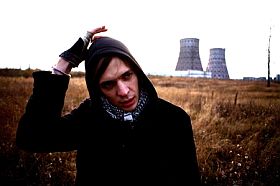


Boris Bertram: Tankograd/2

Russian stories… why are they so attractive, why do they travel so well? Is it because we still know so little about this huge country and its Soviet past? Is it because their stories, like Tankograd, are so much more interesting in their dramatic, often tragic dimension that we are drawn to them – to get away from our own tiny wellfare problems and meaningless media focus on politicians and their (lack of) behaviour? Probably. Or is it because Russians simply are so good for the camera with all their passion and extrovert gesticulation? Or their charm as Boris Bertram depicts so well in this film through the male dancer, who looks like a young Rudolf Nuruyev. And through his female counterpart, sweet and pretty as she stands there in the kitchen with her grandmother. Yes, I know that kitchen. I have seen it so often.
It is not my job to review the film – that is done by Allan Berg, see below – but I want to express my nostalgic pleasure of being taken back to places and situations that I have enjoyed so much in Russia and in the former Soviet republics, that I have visited after 1989/1990.
The small kitchen, the generously arranged dinner tables and the hospitality you meet so often, the vodka bottles, the apple juice that you need to accompany the vodka with to prevent a hangover, the totally worn down and dirty staircases, the small appartment rooms where families find their ways of sitting, eating and sleeping, the constant smoking of cigarettes, the grey appartment blocks… the brewing of coffee at the toilet (not in the film) because this was the only place left for the coffee machine… I have seen it in Riga, Vilnius, Tallinn, Kiev, Minsk and St. Petersburg, and perfectly it is observed and conveyed in the film Tankograd. In many places – luckily – the living conditions have improved, in others not. But the art of survival is still performed within the warm atmosphere that I saw and recognised in Tankograd.